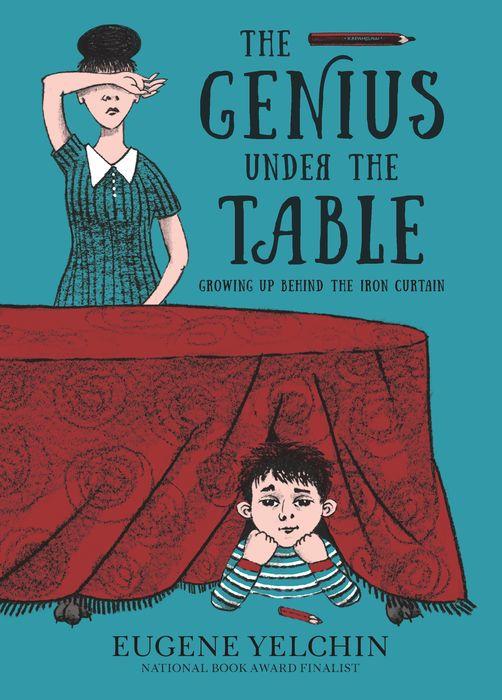Eugene Yelchin’s memoir of his Soviet childhood is surreal, sad, and hilarious.
*The Genius under the Table: Growing Up Behind the Iron Curtain by Eugene Yelchin. Candlewick, 2021, 201 pages.

Reading Level: Middle Grades, ages 8-10
Recommended for: ages 10-15
“The first time I saw real American tourists, they hopped out of a tourist bus in Red Square in Moscow and cut in front of us in line.” Eugene’s (Yevgeny’s) mother was so upset she yelled at them, but the six-year-old boy was entranced by the Americans’ clothes. Such bright colors were like exotic birds among the grays, browns, and olive greens of Russians lined up to see Lenin’s body. And the body in the glass casket didn’t live up to its hype—what the boy remembered most was the bandage on Lenin’s chin. Since he was dead, how could he have cut himself shaving? Perhaps that was his first intimation of the cruel irrationality of Soviet domination.
At home, the family of three adults and two kids lived in a single room, with a bath and kitchen shared by everyone else in their building. At night, when the beds and mattresses came out, the only place for Yevgeny to sleep was under the dining table, where he amused himself drawing on the underside with his dad’s stolen pencil. His father was a devoted communist who nonetheless realized that the only way his two sons could attain a better living standard was by displaying an outstanding talent that proved Soviet superiority. Brother Victor, a figure-skating champion, was already on his way. Their mother, manager of a world-class ballet company in St. Petersburg, dreamed of her younger son becoming a dancer like her heartthrob, Mikael Baryshnikov. But small, awkward Yevgeny showed little promise of that.
Growing up in the shadow of a talented older sibling is a common middle-grade theme, and common throughout the world. To normal growing pains Yelchin adds the surreal atmosphere of the USSR during the 60s and 70s. Like the illustrations, the text is quirky and exaggerated—but only slightly. Memoirs are creative reminiscences; I suspect not all the events he recalls happened in the time frame he implies, but all are true to the impressions they made at the time. As a child’s eye-view of life under communism, it’s genius.
Consideration:
- The a-word is used in Chapter 1.
Overall Rating: 4.5 (out of 5)
- Worldview/moral value: 3.5
- Artistic/literary value: 5
Read more about our ratings here.
Also at Redeemed Reader:
- Reviews: Other books by Eugene Yelchin we’ve reviewed are Breaking Stalin’s Nose, Arcady’s Goal, The Haunting of Falcon House, Spy Runner, and The Assassination of Bragwain Spurge.
- Resource: Find more Cold War books for young teens in our 20th-Century history booklist.
We are participants in the Amazon LLC affiliate program; purchases you make through affiliate links like the one below may earn us a commission. Read more here.
Support our writers and help keep Redeemed Reader ad-free by joining the Redeemed Reader Fellowship.
Stay Up to Date!
Get the information you need to make wise choices about books for your children and teens.
Our weekly newsletter includes our latest reviews, related links from around the web, a featured book list, book trivia, and more. We never sell your information. You may unsubscribe at any time.
We'd love to hear from you!
Our comments are now limited to our members (both Silver and Golden Key). Members, you just need to log in with your normal log-in credentials!
Not a member yet? You can join the Silver Key ($2.99/month) for a free 2-week trial. Cancel at any time. Find out more about membership here.

